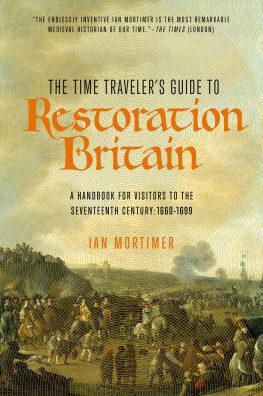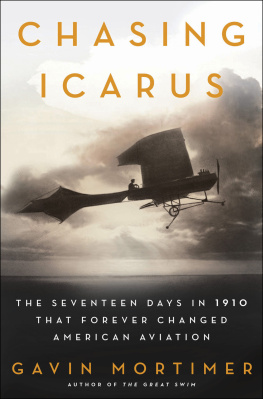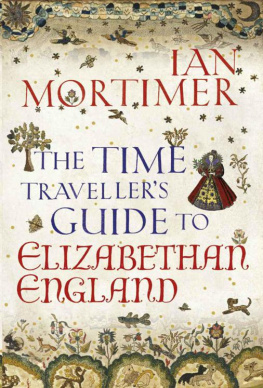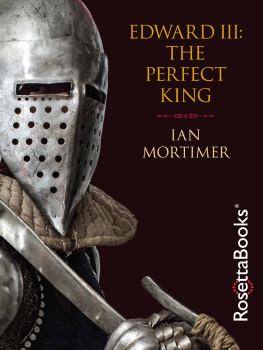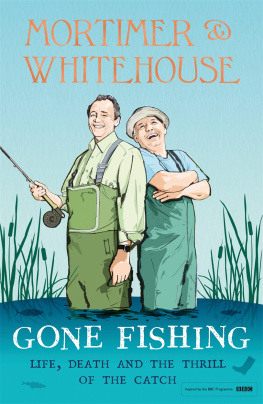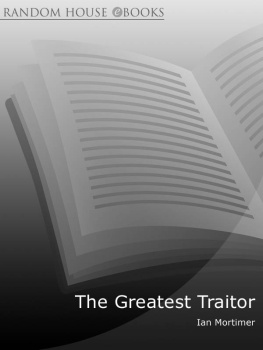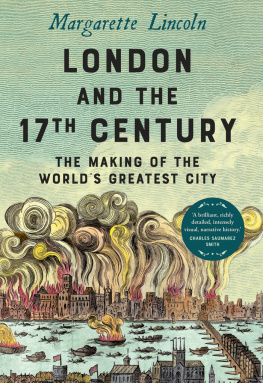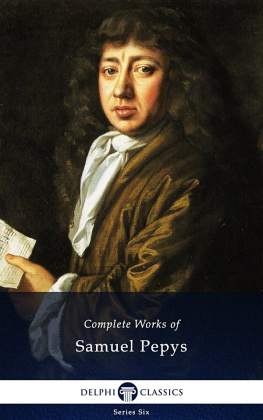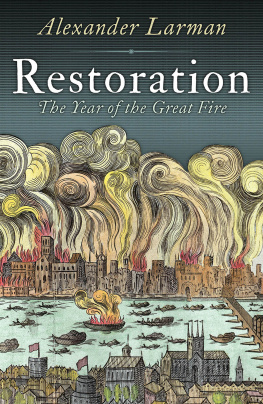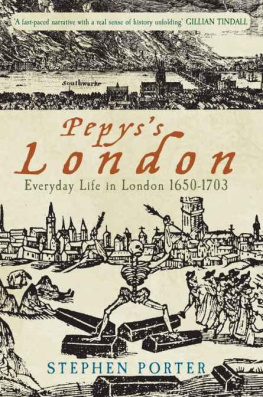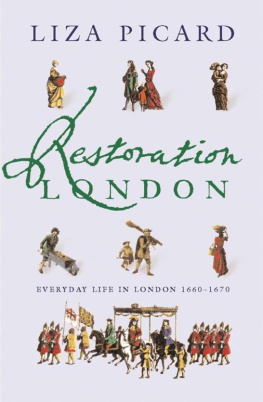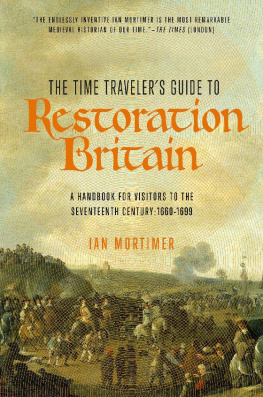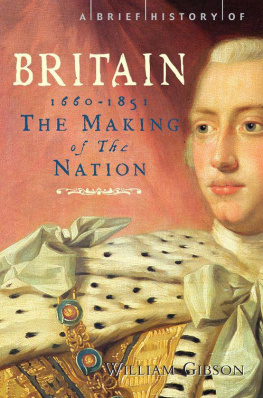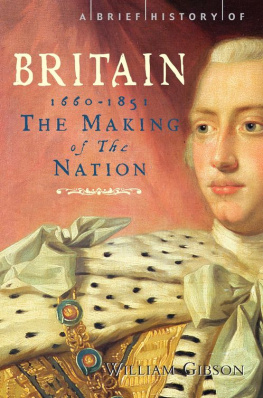
BY THE SAME AUTHOR
The Greatest Traitor:
The Life of Roger Mortimer,
1st Earl of March,
Ruler of England, 13271330
The Perfect King:
The Life of Edward III,
Father of the English Nation
The Fears of Henry IV:
The Life of Englands Self-made King
1415: Henry Vs Year of Glory
The Time Travellers Guide to
Medieval England:
A Handbook for Visitors to the
Fourteenth Century
The Time Travellers Guide to
Elizabethan England
Millennium:
From Religion to Revolution
The Time Travelers Guide to Restoration Britain
A HANDBOOK FOR VISITORS TO THE SEVENTEENTH CENTURY: 1660-1700
Ian Mortimer

T HE T IME T RAVELER S G UIDE TO R ESTORATION B RITAIN
Pegasus Books Ltd
148 West 37th Street, 13th Floor
New York, NY 10018
Copyright 2017 by Ian Mortimer
First Pegasus Books hardcover edition April 2017
All rights reserved. No part of this book may be reproduced in whole or in part without written permission from the publisher, except by reviewers who may quote brief excerpts in connection with a review in a newspaper, magazine, or electronic publication; nor may any part of this book be reproduced, stored in a retrieval system, or transmitted in any form or by any means electronic, mechanical, photocopying, recording, or other, without written permission from the publisher.
ISBN: 978-1-68177-354-4
ISBN: 978-1-68177-400-8 (e-book)
Distributed by W. W. Norton & Company, Inc.
Contents
This book is dedicated to my son, Oliver Mortimer, who ran a weekly parkrun with me during the writing of this book.
Running teaches us many truths, not least that happiness and satisfaction are not the same thing. I hope that youll be happy as long as you live but I hope even more that youll be satisfied.
I am grateful to several people for their assistance with this book. First, the team of Claiborne Hancock and Sabrina Plamitallo-Gonzlez and all of their colleagues at Pegasus Books and W. W. Norton. Authors depend on publishers for many things and most people think in terms of printing books and persuading shops to sell them but we also rely heavily on our publishers encouragement, confidence and patience. Especially the patience. You have been very supportive. I am enormously grateful.
A big Thank You is similarly due to my agent, Georgina Capel, for her advice and her diplomacy. I would like also to record my gratitude to my previous agent, Jim Gill of United Agents, who negotiated the original UK contract for this book and helped me place it and the earlier volumes in the right hands. Thanks are due too to Mandy Greenfield for copy-editing and to Alison Rae for proofreading this book.
As always, I am hugely indebted to my wife, Sophie. Without her love and companionship, I simply could not have spent the required number of hours at my desk to complete this project, nor would I have been contented enough in the twenty-first century to want to enter the late seventeenth century so completely. I owe her yet another century of gratitude.
Ian Mortimer
Moretonhampstead, Devon
The mind is its own place, and in itself
Can make a Heaven of Hell, a Hell of Heaven.
John Milton, Paradise Lost , book one, lines 2545
As you lie down on your feather bed on your first night in Restoration Britain, you will notice the quiet. If youre visiting during the 1690s, maybe you can hear a longcase clock chiming downstairs, in the parlour. If youre here in the 1660s, probably the only sound will be the creak of the staircase as the maid gently makes her way up to sleep in the attic, or that of a dog outside barking at the night watchmen. The bell in the church tower will ring the hour throughout the night, sounding in the starlit darkness beyond your shuttered window. Otherwise there is silence. Like many people, you may let the nightlight burn down, so there is a glow beyond the bed hangings. If youve left them open, youll see the candle flame shining on the wooden panelling of your chamber. On a linen-covered table are the looking glass youll gaze into in the morning, and the combs your maidservant will use to dress your hair in preparation for the day ahead. But therein lies a question: what does the day ahead hold?
The chances are that, even though you come from the modern world and can look back on the period from 1660 to 1700 with the benefit of hindsight, you dont know what destiny awaits you here. These four decades are tumultuous. People experience everything from rapturous enthusiasm for one king to the violent expulsion of his successor. There are wars abroad and riots at home; persecutions of some religious minorities and greater toleration of others; expanding trade in the Far East and the disappearance of the plague from British shores. Most significantly, there is a marked rise of rational, scientific thinking. Professionalism enters many walks of life, the city of London grows into an international capital, and the middle sorts suddenly spring up, with their refined ways of living and fashion-conscious tastes. It is the age of many geniuses. It produces the greatest British architect of all time in Christopher Wren, the greatest British scientist in Isaac Newton and the greatest diarist in Samuel Pepys. It also heralds the greatest composer in Henry Purcell, the greatest woodcarver in Grinling Gibbons and the greatest clockmaker in Thomas Tompion. It sees the heyday of Peter Lely and Godfrey Kneller in the world of painting, the apogee of John Milton and John Dryden in poetry, and it applauds a mass of brilliant actors, actresses and dramatists, including Thomas Otway, Aphra Behn and William Congreve. And dont forget those three other geniuses in science, Robert Boyle, Robert Hooke and Edmond Halley, whose achievements would place them in the front rank, if it were not for Newton. It is the age of innovations, of the arrival of tea, coffee and chocolate, exotic fruit, fine wines and new medicines. Great houses are built in the baroque style, their interiors filled with new fashions in Indian fabric and Chinese furniture and porcelain. Last but not least, this is the great age of the English constitution, during which the ideas of John Locke, the most influential philosopher in the English language, come to be espoused in the Bill of Rights, limiting the power of the king. As a result, whichever year in the late seventeenth century you visit Britain, the day ahead is likely to be full of surprises.
All these changes in society are confusing enough for the indigenous inhabitants. You, the modern visitor, will have the additional difficulty of not being familiar with even the basics of life in the seventeenth-century home. What are you going to eat for breakfast? How do you control the itching of nits and the lice in your clothes? What should you use to brush your teeth? As you wake, the noises of the carts and carriages in the cobbled thoroughfare outside sound strange; so too do the calls and greetings of the street vendors and the pedestrians on their way to market or to church. Open the curtains of your chamber and you will look down through the small panes of uneven, slightly distorting glass to see womens bonnets and gentlemens periwigs as people greet each other in their various stilted or informal fashions. How are you going to get on in this society, which is so unfamiliar to you?
This book will tell you how to live, day by day, in the late seventeenth century. You will learn what to wear and what to eat and drink, which places are the best to stay in, what money can buy, and how to get around. You will learn about lice control and dental hygiene, even if the seventeenth-century practices cause you to squirm. As you will see, the general approach of a Time Travellers Guide is that the past is best viewed close up and personally in contrast to traditional history, which emphasises the value of objectivity and distance. Hence you are very much at the centre of this story. The past might have been solitary, poor, nasty, brutish and short for some, and grandiose and luxurious for others, but simply to be told these things does not compare with seeing life at close hand, albeit in your minds eye.
Next page
